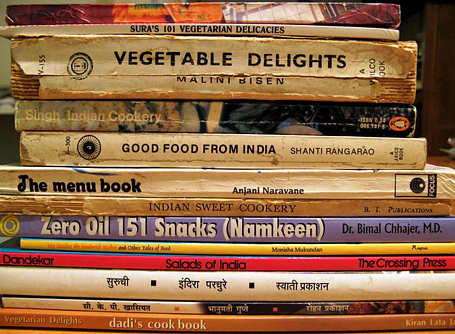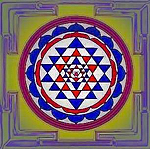
Last year, in anticipation of a long stay in India, I began organizing my collection of food-related books into a catalogue. As far as collections go, my cooking library is fairly modest with around 200 books. The catalogue, however, reveals a pattern that is, by and large, a reflection of my culinary inclinations.
- 95 percent of the collection relates to the food of India.
- Of these, only four or five cookbooks are published outside India.
- Hardly two of the cookbooks describe themselves as Indian cookbooks.
- There are zero books on fusion food. Before someone reiterates the profundity that all Indian food is ultimately fusion food because chillies and tomatoes were brought to India by foreigners, let me hasten to add that I am referring to fusion as we know it today.
- None of the books are written by professional chefs or owners of restaurants serving “authentic Indian” cuisine; a miniscule number are written by serial cookbook authors; and none of them promise a meal with three ingredients in less than 20 minutes.
Infer what you will from these facts, but one thing has become amply clear to me over the last fifteen years since I began collecting these books. There is a vast body of English and regional-language cookbooks published in India by small publishers or the authors themselves. Most of these modest cookbooks never make it to the shelves of the large mainstream bookstores even in India. They have to be ferreted out of small local bookshops, from publishers’ offices, or directly from the authors. It is, however, here that the best Indian cookbooks are to be found, for they are authored by individuals who cook for their families, love their subject and are willing and able to communicate their knowledge.
For a number of reasons, these books lie largely below the radar of the traditional media, the internet, and the large chain bookstores. First and foremost, cookbooks in regional languages rarely gain a readership outside the geographical state or community that is literate in those respective languages. Even among the books written in English, which have the potential for wider demand, the authors often lack the means, inclination, or savvy to grease the media and marketing machinery into their service. Therefore, most of these books do not get the benefit of newspaper and magazine reviews or grand releases with a celebrity cutting the ribbon. Last and least, as is true of most things these days, medicrity abounds here too. Some of these books probably deserve their share of oblivion for their poorly written recipes, terrible photos, and quite simply, bad food.
So what makes a good cookbook?
Culinary enthusiasts have long debated this in forums, blogs, conferences, and articles. The answers vary depending on whom you ask. A publisher will tell you that it must reach out to a large readership base. Young men who “also cook” love books with pictures of female chefs bending over the pot and licking the spoon. Twenty-and-thirty-something women want to see, above all, lovely photographs of the food. The inexperienced want clear instructions that leave nothing to culinary imagination or wisdom. The reluctant cooks wait for books that will fire their dormant enthusiasm and catapult them from couch to kitchen. The ignorant want books that “comprehensively” cover the “ethnic” cuisine that catches their latest fancy. The purists look for authenticity; the apologists throw up their hands in the air and ask, “what is authenticity”?
Notwithstanding my somewhat flippant tone above, this is a serious question with no easy answers, which is why I have never understood the rationale behind lists such as “Five Best Indian Cookbooks”. Perhaps they serve a purpose in guiding those who are completely new to Indian cuisines. As someone who has grown up on home-cooked Indian food and now cooks it almost everyday, there really is no one (or even ten) great Indian cookbook. My culinary needs vary at different times: on some days, I want to spend three hours making a biryani in 20 difficult steps; on other days, I want to quickly find a new way to use up the five drumsticks and two brinjals sitting expectantly on the kitchen counter. There are days when I would rather lie on the couch and read about the old days when Indian kitchens did not have pressure cookers and mixer-grinders. I might be curious about how Kolhapuri mutton rassa is made although I am vegetarian and would not eat the dish except under extreme duress. Above all, I need Indian food books to keep feeding my interest in the subject almost daily for the more you explore it, the more acute the realization of how little you actually know. Therefore, I will not attempt to define my criteria for a good Indian cookbook.
In this series, I will highlight some selected books from my personal collection. These books are not likely to win awards or cookbook contests and they are not without their faults, but each one has some trait that I value in a cookery book. The series is also a small way of putting the spotlight on cookbooks that deserve more attention than they have received in the media. Since my literacy is limited to English, Marathi, Konkani, and Hindi, my collection is entirely comprised of books in these languages. I would love to hear from readers about their favourite lesser-known cookbooks in these and other regional languages.
Veena Parrikar
(Mahanandi will feature a column by Sreemathi Veena Parrikar, a culinary enthusiast and an excellent writer, on first Monday of every month. – Indira)

A very good initiative, Veena. And thank you Indira for giving this series through Mahanandi. For readers like me who have taken a keen interest in collecting regional cooking books, this will be a good reference point.
Comment by Latha — January 6, 2008 @ 2:14 am
A very Different Series..All the Very Best.
Comment by lavi — January 6, 2008 @ 2:45 am
I eagerly await this series, Veena. There are many gems there I’m sure and it would be good to hear about them, and maybe, some may be available in print still.
Comment by Anita — January 6, 2008 @ 8:52 am
Dear Veena, Your blog is so insightful and written with such style, wonderful grammar, and precision. Thank you. My thanks also to Indira for bringing such culinary enlightenment to us eager readers.
Comment by Ardith — January 6, 2008 @ 11:55 am
I love the idea of this column…I’ve enjoyed reading Veena’s writing earlier on this blog, and eagerly look forward to this series 🙂 Warm wishes for a wonderful 2008!
Comment by aspiringannapoorna — January 6, 2008 @ 12:35 pm
I also love collecting indian cooking books. Great idea about Veenaji’s series. looking forward to it. U have such beautiful cook books, some old some new.
Comment by vimmi — January 6, 2008 @ 2:27 pm
Dear Veena and Indira, allow me to chime with more of the same — what a wonderful, inspired idea! I am very much looking forward to learning more about *real* Indian cookbooks — and perhaps where I might find a few! I collect cookbooks too 😉
I just love the photo 🙂
Comment by Linda — January 6, 2008 @ 5:03 pm
Thank you for bringing this out. I had similar ideas, i was wondering when i am going to find time to materialize with 2 smal children and household :).
Thanks for beginning it.
Archana
Comment by Archana — January 6, 2008 @ 9:35 pm
Oh this is wonderful. If only it was possible/easy to find such books in the US. I have many Indian cookbooks, many of which I treasure, and a few that fit into the categories you admire (small, often regional). But not being Indian, and traveling infrequently to India it is hard for me to track these types of books down. Nonetheless it is always my top priority when in India to buy and bring back cookbooks. If nothing else I just love reading them. I love the idea that I am cooking someone’s grandma’s food. I do my best to interpret them as best I can, not being Indian myself – and just loving the cuisine and to cook (especially lesser known regional) Indian food.
Comment by Diane — January 6, 2008 @ 11:04 pm
I’m really looking forward to reading this ongoing column! I’ve started using Library Thing to catalog my books (including cookbooks) and have a number of Indian cookbooks (all published in the US) and am excited to learn more about what else is out there.
Comment by Hannah — January 8, 2008 @ 4:36 pm
Thank you Indira for your excellent work with this site, and thanks for bringing me this priceless resource with Veena Parrikar’s write-ups.
I was going to start hunting for a salad book stemming from similar frustrations she mentions in her article.
& Thanks Hannah for mentioning ‘library thing’ ..That is neat!!
Comment by nila — January 12, 2008 @ 10:15 am
Indira:
Fantastic initiative! I am really hooked to your website – like your style and presentation. Happy New year!
Seetha
Comment by Seetha — January 12, 2008 @ 9:22 pm
Are there any new cookbook reviews coming up? this makes very interesting reading! best, ali.
Comment by ali — March 31, 2008 @ 10:26 am